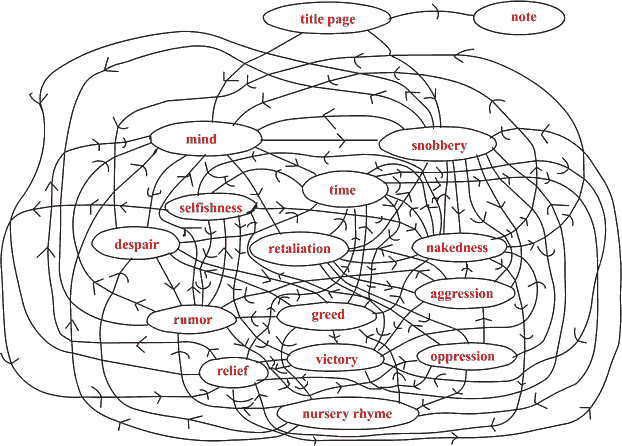Text is changeless, but unlike time that is suggestively nonlinear, the possibility of a kaleidoscope book is restricted by linearity and it’s fixations. If such a book were to exist and wholesomely respond ‘to you moods, your whims, your latest fetish’s’, where would the author lie? How would you know when you had completed the book? If by putting down the book the story stopped, couldn’t your revision add new twists, new events and new characters within the narrative?
These are the poignant concepts and thoughts fabricated by Douglas, whose interactions with the future of readings is caught between the standardisation and converse link of hypertext. Addressing the new nature of hypertext in comparison to traditional nodes of writing, the reading addressed the applications (and implications) the reader is submitted to, particularly around consumption and prioritising. The idea of readers taking multiple directions and situations from stories can serve both trouble and confusion. He uses examples of classic literature being translated into film, the adaptation of the protagonist and author changing both arts and entertainment.

Although the reading circles around hypertext as a tool for extending writing, the radically different settings and meanings connected within the language of hypertext is ironically simple. Hypertext fictions, for example, display complex relationships and constructions, but are limited by segments of text, pages, sites, windows and the reader themselves. While Barthe’s Death Of The Author declares ‘the reader is a single device that ultimately controls the signifying potential of any text’, what happens if the authors of hypertext want the reader to integrate their own intertextuality? Does this mean that everyone is a plural for a greater noun?
It’s hard to discuss hypertext when the language we use to understand and interpret it is structured, so much so they have become ‘cultural buzzwords.’ While there’s no denying the conventions, there should be a level of uncertainty when considering writing as straightforward and contemporary through time (after all, Plato was). With this being said, ‘hypertext is as much a concept as it is a form of technology’, which exerts the reading completely as what things appear to be and what they are not.
